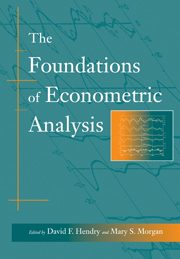Book contents
- Frontmatter
- Contents
- Preface
- Acknowledgements
- Introduction
- Bibliography
- I The Emerging Role of Econometrics in Economics
- II Early Time-Series Analysis
- III Applied Econometrics and the Identification Problem
- IV The Evolution of Statistical Thinking in Econometrics
- V Dynamic Models
- VI The Tinbergen Debate
- 33 Statistical Testing of Business Cycle Theories: A Method and its Application to Investment Activity (League of Nations, Geneva, 1939, vol. I, pp. 34–43, 47–64)
- 34 Professor Tinbergen's Method (Review of Tinbergen (1939), vol. I, Economic Journal vol. 49, 1939, pp. 558–68)
- 35 Mr Keynes on the Statistical Verification of Business Cycle Theories (unpublished, 1940)
- 36 Econometric Business Cycle Research (Review of Economic Studies, vol. 7, 1940, pp. 73–80)
- 37 Autonomy of Economic Relations (League of Nations Memorandum, 1938) and J. Tinbergen's reply (both unpublished)
- VII Structure and Simultaneity
- VIII The Probabilistic Revolution
- IX Exogeneity
- Index
35 - Mr Keynes on the Statistical Verification of Business Cycle Theories (unpublished, 1940)
Published online by Cambridge University Press: 05 June 2012
- Frontmatter
- Contents
- Preface
- Acknowledgements
- Introduction
- Bibliography
- I The Emerging Role of Econometrics in Economics
- II Early Time-Series Analysis
- III Applied Econometrics and the Identification Problem
- IV The Evolution of Statistical Thinking in Econometrics
- V Dynamic Models
- VI The Tinbergen Debate
- 33 Statistical Testing of Business Cycle Theories: A Method and its Application to Investment Activity (League of Nations, Geneva, 1939, vol. I, pp. 34–43, 47–64)
- 34 Professor Tinbergen's Method (Review of Tinbergen (1939), vol. I, Economic Journal vol. 49, 1939, pp. 558–68)
- 35 Mr Keynes on the Statistical Verification of Business Cycle Theories (unpublished, 1940)
- 36 Econometric Business Cycle Research (Review of Economic Studies, vol. 7, 1940, pp. 73–80)
- 37 Autonomy of Economic Relations (League of Nations Memorandum, 1938) and J. Tinbergen's reply (both unpublished)
- VII Structure and Simultaneity
- VIII The Probabilistic Revolution
- IX Exogeneity
- Index
Summary
In the September issue of the Economic Journal, Mr Keynes discusses critically the work done by Professor Tinbergen with the League of Nations on the ‘Statistical Testing of Business Cycle Theories’. We share Mr Keynes' opinion on some of the shortcomings of statistical procedures and even see a few further such shortcomings. Mr Keynes' criticism, however, seems to us to be going too far and to question the practicability of any attempts to test business cycle theory statistically. We do not think that the shortcomings in Professor Tinbergen's work are due to any logically inherent impossibility of verifying business cycle theory statistically. Since we are both in profound agreement with the economic theories of Mr Keynes, we are anxious to prevent the readers of the Economic Journal getting from Mr Keynes' review the impression that his theories are not capable of empirical and statistical verification. We believe, on the contrary, that many of the ideas expressed in the ‘General Theory of Employment’ are capable of such verification.
Some of the misunderstandings contained in Mr Keynes' review are due to the fact that it was written without the knowledge of Mr Tinbergen's second volume which has become available only a short time before the review was published (‘Business Cycles in the United States, 1919–1932’, Geneva, 1939). The second volume is the one concerned with trade cycle theories proper, while the first merely gives a few examples of the well-known method of multiple regression.
Information
- Type
- Chapter
- Information
- The Foundations of Econometric Analysis , pp. 390 - 398Publisher: Cambridge University PressPrint publication year: 1995
Accessibility standard: Unknown
Why this information is here
This section outlines the accessibility features of this content - including support for screen readers, full keyboard navigation and high-contrast display options. This may not be relevant for you.Accessibility Information
- 6
- Cited by
